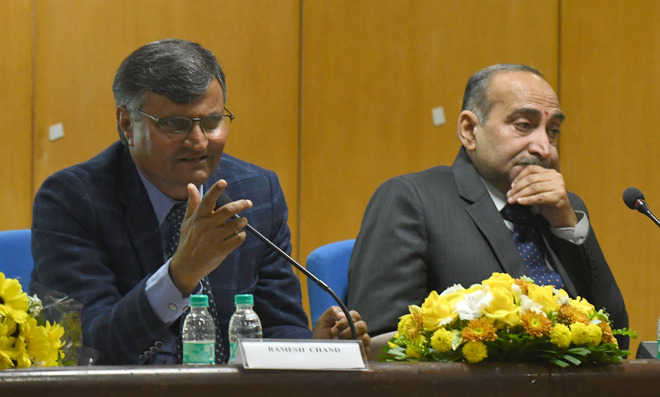
Ramesh Chand, member, NITI Aayog, speaks during an event at Panjab University in Chandigarh on Tuesday. Tribune Photo: Pradeep Tewari
Tribune News Service
Chandigarh, January 29
Loan waivers are not a solution to fight agricultural stress, said NITI Aayog member Prof Ramesh Chand, who was at Panjab University for Brij Narain Memorial Lecture today.
Speaking on the sidelines of the event, Prof Chand said they were on track to double farmers’ income by 2022.
“Attempts are being made. There are five-six factors, which we have identified. We are on track as far as growth and output are concerned. Last three years’ average growth rate is 4.5 per cent. In six-seven years, 40 per cent increase will happen. As per our calculation, there will be 23 per cent hike in prices because of increase in price realisation by farmers. I think there, we are not on track,” said Prof Chand.
During his lecture, the panel member said for the last 25 years, ever since India started publishing data on farmer suicides, the agrarian stress dominated the discourse on agriculture. “We overlooked good things like from 2005-2012, the income of farmers increased at a faster rate than a non-farmer. There was a shift from scarcity to surplus when we compared the current agriculture scenario with that of the 1970s,” he added.
On subsidies, he said the amount spent on infrastructure in agriculture was double the subsidies in 1970s while the quantum of funds spent on infrastructure now was four times that of subsidies. “If you include loan waiver of three-four states, it would further go up,” he said.
He lamented low corporate investment in agriculture. “For every Rs 100 invested in agriculture, 82 per cent is put in by the farmer himself, 15 per cent comes from government in terms of canals and water while the corporate investment is just 0.9 per cent,” he said.
He said the agriculture sector had been neglected after economic reforms, which had resulted in a continuous decline in farm incomes. “The transformation is not taking place in this sector because of the institutional bottlenecks in the import of inputs and technology for the farm sector,” he said.
He added that the food processing sector in India, which is highly labour intensive, should have grown at a rate faster than the agricultural produce but it has not happened despite a separate ministry for it.
Prof Chand also underlined the fact that the prices of agricultural produce rose much lesser than the rate of inflation, directly hitting the farmer. The states are not implementing several reforms like the agricultural market reforms.
Earlier, Prof Upinder Sawhney, chairperson of the department, introduced the speaker and Prof Shankarji Jha, Dean of University Instructions, honoured him.



























